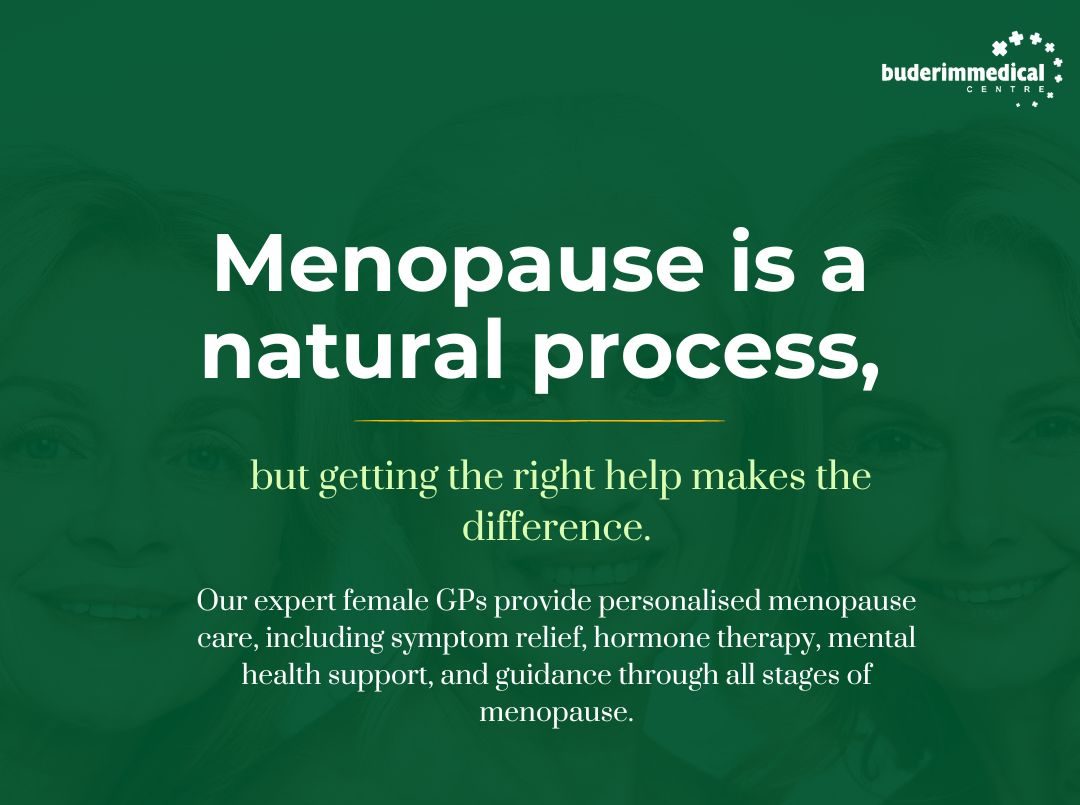Understanding Menopause: Symptoms, Stages, and Treatments

Menopause is a natural biological process that marks the end of a woman’s reproductive years. While it’s a normal part of aging, the symptoms and changes that come with menopause can be significant. In Australia, where women are living longer and healthier lives, menopause is receiving increased attention, both in the media and in healthcare. Understanding menopause, its stages, and available treatment options can help women navigate this important phase of life with confidence.
What is Menopause?
Menopause is defined as the point in a woman’s life when she has gone 12 consecutive months without a menstrual period. Typically occurring between the ages of 45 and 55, this phase signals the end of menstruation and fertility. Menopause is driven by changes in the ovaries’ hormone production, leading to a decrease in the hormones oestrogen and progesterone.
The Stages of Menopause
Menopause is a gradual transition that occurs in three distinct stages. Each stage brings its own set of changes and challenges as the body adjusts to hormonal shifts. Here’s a breakdown of what you can expect during each stage of menopause:
1. Perimenopause
Perimenopause typically starts several years before actual menopause, usually in a woman’s 40s. During this time, hormonal fluctuations lead to irregular periods and other changes in the menstrual cycle. Symptoms like hot flushes, night sweats, and mood swings are common, and for many women, this is the first sign of the body transitioning towards menopause.
2. Menopause
Menopause officially begins when a woman hasn’t had a period for 12 consecutive months. At this point, the ovaries stop releasing eggs, and levels of oestrogen and progesterone drop significantly. This stage signals the end of your reproductive years, and many women experience a variety of physical and emotional changes during this time.
3. Postmenopause
Postmenopause refers to the years following menopause. While symptoms such as hot flushes and mood swings may persist for some women, they usually lessen as the body adjusts to the new hormonal balance. This phase can bring relief from the more intense symptoms of menopause, but ongoing health checks are important to monitor bone health, cardiovascular health, and overall well-being.
Common Menopause Symptoms
Every woman experiences menopause differently, but common symptoms include:
- Hot Flushes: Sudden feelings of heat, often accompanied by sweating and reddening of the skin.
- Night Sweats: Excessive sweating at night, leading to disrupted sleep.
- Mood Swings: Changes in mood, including feelings of irritability, anxiety, or sadness.
- Vaginal Dryness: Decreased oestrogen levels can lead to vaginal dryness, which may cause discomfort during intercourse.
- Sleep Disturbances: Difficulty falling asleep or staying asleep due to night sweats or anxiety.
- Memory Problems: Some women experience “brain fog” or forgetfulness during menopause.
- Urinary Issues: Increased frequency of urination or urinary incontinence.
Menopause and Long-Term Health Implications
While menopause brings immediate changes, it can also have lasting effects on your health. It’s important to understand these potential long-term impacts so you can take proactive steps to maintain your well-being as you navigate this life stage. Here’s how menopause might affect your health in the years that follow:
Bone Health
One of the most significant long-term effects of menopause is the decline in bone density, which can increase the risk of osteoporosis. To counteract this, women are advised to ensure adequate calcium and vitamin D intake, as well as engage in weight-bearing exercises.
Cardiovascular Health
Oestrogen helps protect the heart, so after menopause, the risk of heart disease increases. Adopting a heart-healthy lifestyle, including regular physical activity and a balanced diet, is key to managing this risk.
Mental Health
The hormonal fluctuations that accompany menopause can also impact mental health. Mood swings, anxiety, and depression are more common during this period. Many women find that seeking psychological support helps manage these symptoms.
Treatment Options for Menopause Symptoms
Managing menopause often involves a combination of therapies and lifestyle changes. Here are some of the most common treatment options:
Hormone Replacement Therapy (HRT)
HRT is the most effective treatment for alleviating menopause symptoms, such as hot flushes and vaginal dryness. By supplementing oestrogen (sometimes with progesterone), HRT helps replace the hormones that are no longer being produced.
Non-Hormonal Medications
For women who are unable to take HRT, non-hormonal medications like antidepressants or gabapentin (for hot flushes) can provide symptom relief. These medications work in different ways, including reducing mood swings or decreasing the frequency of hot flushes.
Lifestyle Changes
Adopting a healthy lifestyle is one of the most effective ways to manage menopause symptoms. Regular exercise not only helps strengthen bones but also lifts your mood and aids in maintaining a healthy weight. A balanced diet, packed with calcium and vitamin D, is essential for promoting strong bones and overall well-being during menopause.
Alternative Therapies
Some women explore natural treatments like acupuncture, herbal supplements (e.g., black cohosh, soy), or yoga. While these options may provide symptom relief for some, it’s essential to consult your doctor before trying them to ensure they’re safe and effective.
Bone and Heart Health Support
Women are encouraged to maintain strong bones through weight-bearing exercises and calcium supplementation. For heart health, managing cholesterol and engaging in regular cardiovascular exercise are essential.

Take the Next Step Towards Managing Menopause with Buderim Women’s Health Clinic
Menopause is a natural part of life, and at Buderim Medical Centre, we are dedicated to helping you navigate this significant transition with care and understanding. Our team of experienced female GPs provides personalised menopause assessments, expert advice, and tailored management strategies, ensuring you stay healthy and empowered through every stage of menopause.
Serving Buderim and the Greater Sunshine Coast area, we’re here to support women in their menopause journey. If you’re experiencing symptoms or have any questions about your health during this time, reach out to us today.
Contact Buderim Medical Centre to schedule a menopause consultation with our compassionate team. Let us help you manage menopause effectively and improve your well-being during this important stage of life.
FAQs About Menopause
What age does menopause typically start?
Menopause commonly occurs between the ages of 45 and 55, though some women may experience it earlier or later. If your symptoms start outside this typical age range, it’s important to consult with a healthcare professional to rule out any underlying concerns.
Can menopause cause weight changes?
Yes, weight gain is a common experience during menopause, particularly around the abdomen. This is largely due to hormonal shifts, including a decline in oestrogen levels. Embracing a balanced diet and regular physical activity can help manage weight effectively and maintain overall well-being during this natural life transition.
Are there any natural treatments for menopause?
Some women explore natural treatments like herbal supplements (e.g., black cohosh, evening primrose oil) or acupuncture to alleviate symptoms. However, it’s essential to discuss these with a healthcare provider before starting any new treatment.
How long do menopause symptoms last?
Symptoms typically last for a few years, but for some women, they can persist longer. While hot flashes and night sweats tend to subside after a few years, other symptoms may continue postmenopause.
Can menopause cause depression?
Yes, the hormonal changes during menopause can contribute to mood swings and an increased risk of depression. Women experiencing significant mood changes should consult a healthcare professional to explore treatment options.





